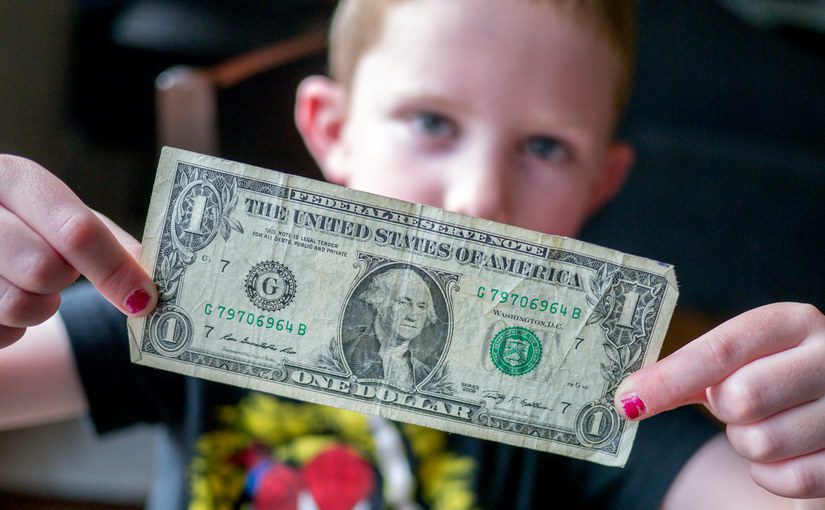In the past six months, I’ve had a few conversations with parents of young kids (8 and under), and none of them are actively teaching their kids about money, instead figuring they’ll do it “later”. According to this study by the UK’s Money Advice Service, basic money habits are formed in kids by age seven. By the time most parents think their kids are “ready”, the money habits are already formed. In these conversations I’ve had, some of the common reasons for avoiding “the money talk” among parents are have included:
The Myth: “My kids aren’t old enough to understand much about money yet.”
The Reality: There’s a great saying that goes “More is caught that taught”, and having been a parent for the past six years, I can vouch for the truth of it. Your kids are watching what you do, and learning from it. They’re watching you spend, and save (or not). They’re watching what you buy, and they’re listening to what you say about money in your home. If you’re having financial struggles, they may be watching you and your spouse fight about money. If you’re not purposefully explaining your actions regarding money, your kids are going to come up with their own interpretations of what money is all about. You’d be surprised what your kids have picked up about money along the way, but don’t leave their education half-finished.
The Myth: “I’m not very good with money, so I don’t know what to teach them or where to start…”
The Reality: No matter how “bad” you are with money, as an adult you know the basics: don’t spend more than you make, save for a rainy day (and your retirement), and don’t get into debt. Even if you’re not actively accomplishing all those things in your own financial life, you can tell your kids the basics. And you may find something interesting happen: by teaching your kids why those things are important, you may find the inspiration to change your own money habits along the way. Here’s the thing though: be open with your kids about your struggles with financial management and don’t try to say one thing and do the opposite. Explain how things should work with money in your family, explain why they don’t yet work that way, then explain what you’re doing to change that. Make your kids part of the journey toward a healthier financial household.
The Myth: “My kids will learn about money when they get their first job.”
The Reality: That may be when they get their first paycheque, but by then they will have formed all their basic money habits. It will be too late, and the only lessons they’ll learn from that point on are the painful ones. Life lessons should be memorable; they don’t have to be painful.
The Myth: “My kid has enough to worry about, I don’t want to burden her with another thing.”
The Reality: Perhaps the greatest burden – the greatest handicap on their future – that you can place upon your child is to keep them ignorant of money and financial concepts until they’re beyond your ability to influence. Don’t let your kids start their financial journey clueless and ignorant about what to do with the single greatest wealth-building tool they’ll ever have: their paycheques. Your kid will worry for the rest of their lives about money if they’ve never been taught the right way to handle it.
The Myth: “They’ll learn about money management in school.”
The Reality: Not from their teachers or classes they won’t. Doing fraction problems in math class involving quarters is not a financial education. Who they will learn from are their peers, watching how their friends spend money. Who do you want educating your kids?
The Myth: “Nobody taught me about money, I had to learn the hard way. So will my kids!”
The Reality: If you want your kids to be safe in the pool, you make sure they know how to swim. You don’t toss them into the deep end of the pool and hope for the best. Parenting is about equipping your kids with the tools they need to succeed. In the same way that a parent can’t swim on behalf of their kid for the rest of their lives, a parent can’t be financially responsible for their kid forever either. But the training has to be there.
So when should you have the first of many money conversations with your kid? What does it entail, and what are the benefits of starting early? Check out part two.
Since this is my first real attempt at an educational money-focused blog post, please share your impressions and thoughts with me in the comments.

This is really good advice. I think the “my child isn’t old enough” and “I don’t know what to say” excuses are the most common. You make a good point about how perceptive children can be and that they will learn a lot simply by watching how their parents talk about and treat money. Also, there is a moment of self reflection when you try to teach your child about money. You can’t help but to set an example when you know that your children are paying close attention.